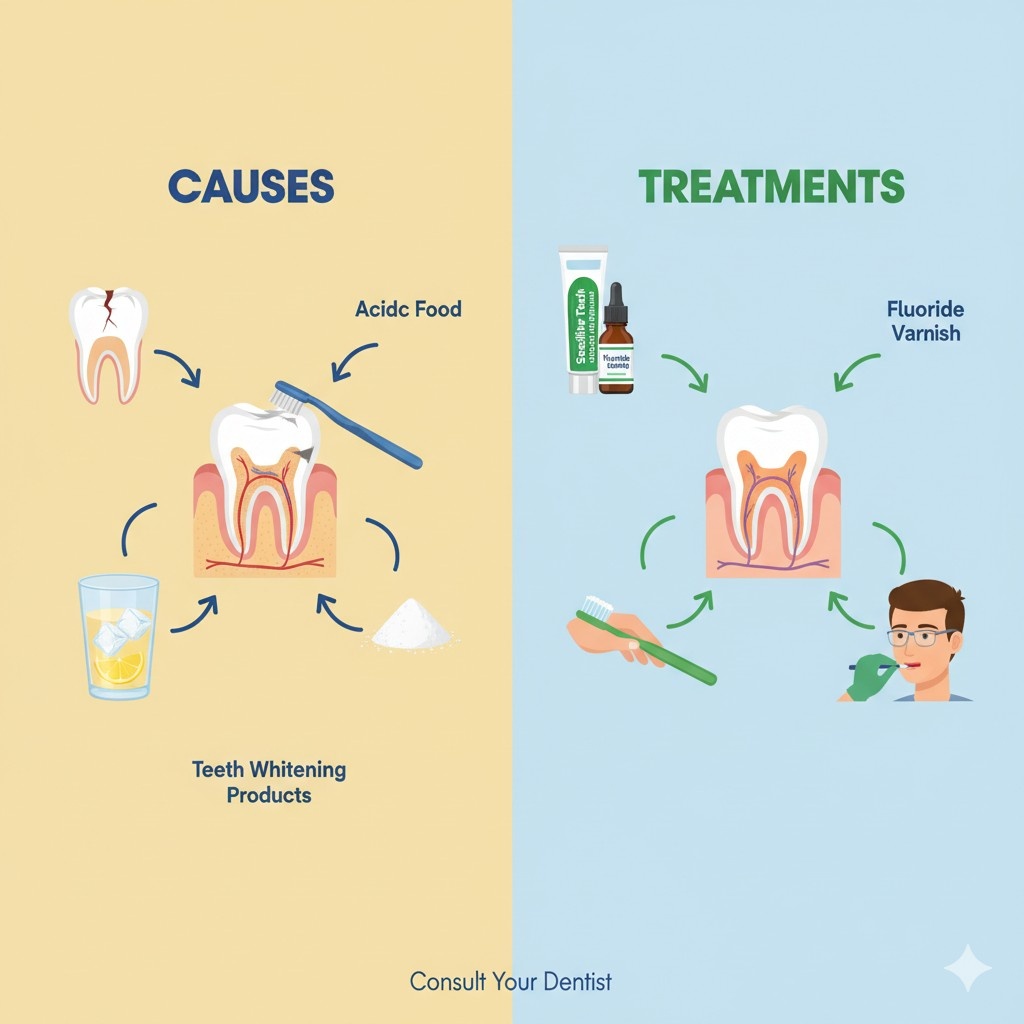What Causes Tooth Sensitivity and How to Treat It
Tooth sensitivity is a common dental issue that affects millions of people. Whether it’s a sudden jolt when you sip hot coffee or a sharp pain when eating ice cream, sensitive teeth can interfere with everyday activities and lower your quality of life. At Arlington Dental, we often see patients who are unsure why their teeth have become so sensitive—or what they can do about it.
In this article, we’ll explore the causes of tooth sensitivity, what it means for your oral health, and the most effective treatment options available.
What Is Tooth Sensitivity?
Tooth sensitivity, or “dentin hypersensitivity,” occurs when the protective layers of your teeth—such as enamel or cementum—are worn down or compromised, exposing the inner dentin layer. Dentin contains tiny tubules that connect directly to the nerves inside your tooth. When these tubules are exposed to hot, cold, sweet, or acidic foods, it can trigger pain or discomfort.
Common Causes of Tooth Sensitivity
There are several reasons why your teeth might become sensitive, including:
- Enamel Erosion
The most common cause of tooth sensitivity is enamel erosion—the gradual wearing away of your tooth’s outer protective layer. This can be caused by:
- Acidic foods and drinks (soda, citrus, wine)
- Aggressive brushing with a hard-bristled toothbrush
- Brushing too soon after meals, when enamel is softer
- Teeth grinding (bruxism), especially at night
- Gum Recession
When gums recede due to age, gum disease, or aggressive brushing, the roots of your teeth become exposed. Unlike the crown of your tooth, which is covered by enamel, the roots are protected only by cementum—a much softer material that wears down easily, leading to sensitivity.
- Tooth Decay or Cavities
Cavities can expose the dentin or even reach the pulp of your tooth, causing pain and sensitivity to temperature or pressure.
- Cracked or Chipped Teeth
Cracks in your teeth can expose the inner layers and lead to sharp pain, especially when biting or chewing.
- Worn Dental Work
Old fillings, crowns, or dental restorations that no longer fit properly can allow bacteria or food particles to reach sensitive areas of the tooth.
- Recent Dental Procedures
After a dental procedure such as teeth whitening, fillings, or a crown placement, temporary sensitivity is common. This usually resolves within a few days, but if it persists, it should be evaluated by a dentist.
How to Treat Tooth Sensitivity
Treatment for sensitive teeth depends on the underlying cause. At Arlington Dental, we’ll perform a full examination to determine the reason behind your discomfort and develop a customized treatment plan. Here are some of the most common treatment options:
- Desensitizing Toothpaste
One of the simplest and most effective treatments is using a desensitizing toothpaste. These contain ingredients like potassium nitrate or stannous fluoride, which help block the nerve signals that cause pain. You may need to use it consistently for several weeks before noticing a significant improvement.
- Fluoride Treatments
Fluoride helps strengthen enamel and reduce the transmission of sensations to the nerves. We may recommend an in-office fluoride treatment or a prescription-strength fluoride gel to use at home.
- Dental Bonding or Sealants
If your sensitivity is due to exposed dentin or root surfaces, we can apply a bonding agent or sealant to cover the sensitive area and protect the tooth.
- Treating Gum Disease
If gum recession from periodontal disease is the cause, treating the gum infection and performing procedures like scaling and root planing can help reduce sensitivity and protect the tooth roots.
- Night Guards for Teeth Grinding
If you grind your teeth at night, we may recommend a custom night guard to protect your enamel from further wear and reduce sensitivity.
- Restorative Procedures
For severe cases—such as decay, cracks, or worn restorations—we may need to place a filling, crown, or even perform a root canal if the nerve is affected.
Tips to Prevent Tooth Sensitivity
In addition to professional treatments, there are steps you can take at home to reduce your risk:
- Use a soft-bristled toothbrush and gentle brushing technique.
- Avoid acidic foods and drinks, or rinse with water after consuming them.
- Don’t brush immediately after eating—wait at least 30 minutes.
- Maintain a consistent oral hygiene routine with fluoride toothpaste.
- Visit Arlington Dental for regular checkups and cleanings.
When to See a Dentist
If you’re experiencing tooth sensitivity that’s frequent, intense, or getting worse, don’t ignore it. It could be a sign of a more serious dental problem that needs attention. Early treatment not only relieves discomfort but also prevents further damage.
Final Thoughts
Tooth sensitivity is more than just a minor annoyance—it’s your body’s way of telling you that something may be wrong. The good news is, it’s often treatable and manageable with the right care. At Arlington Dental, we’re here to help you find relief and keep your smile strong and pain-free.
Ready to say goodbye to tooth sensitivity?
Schedule your visit with Arlington Dental today and let us help you smile with confidence again.

